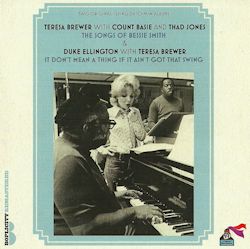Teresa Brewer with Count Basie
1. Trombone Cholly
2. Gulf Coast Blues
3. Down Hearted Blues
4. Baby Won’t You Please Come Home
5. St Louis Blues
6. After You’ve Gone
7. I Ain’t Got Nobody
8. Gimme a Pigfoot
9. I Ain’t Gonna Play No Second Fiddle
Teresa Brewer with Duke Ellington
10. It Don’t Mean a Thing if it Ain’t Got That Swing
11. I Ain’t Got Nothin’ but the Blues
12. Satin Doll
13. Mood Indigo
14. Don’t Get Around Much Anymore
15. I’m Beginning to See the Light
16. I’ve Got to be a Rug Cutter
17. I Got It Bad and That Ain’t Good
18. Tulip or Turnip
19. It’s Kinda Lonesome Out Tonight
20. Poco Mucho
Teresa Brewer – Vocals with:
Tracks 1-4
Count Basie – Piano
Freddie Greene – Guitar
Norman Keenan – Bass
Sonny Payne – Drums
J. C. Williams, Robert Plater, Johnny Board, Eric Dixon, Curtis Peagler – Saxes
Frank Gaines Hooks, Henry Coker, William Hughes, Melvin Wenza - Trombones
Paul Cohen, Stephen Furtada, George Ninger, Waymon Reed, Sonny Cohn – Trumpets
Tracks 5-9
Count Basie – Piano
Sonny Cohn – Trumpet
Henry Coker – Trombone
Eric Dixon – Tenor sax
Freddie Greene – Guitar
Norman Keenan – Bass
Sonny Payne – Drums
Tracks 12, 14, 17, 19
Duke Ellington – Piano
Harry Varney, Russell Procope, Harold Minerve, Harold Ashby, Norris Turner – Reeds
Vince Prudente, Chuck Connors, Art Baron – Trombones
Money Johnson, Ray Nance, Johnny Coles, Barry Hall – Trumpets
Joe Benjamin – Bass
Quentin White Jr. – Drums
Tracks 11, 15
Add Tyree Glenn – Trombone
Tracks 10, 16
Add Mercer Ellington, Joe Newman, Ernie Royal, Jimmy Owens, Jimmy Nottingham – Trumpets,
Bunny Briggs – Vocals
Track 18
Duke Ellington – Piano
Joe Beck – Guitar
Herb Bushler – Electric guitar
Pretty Purdie – Drums
Bunny Briggs – Vocals
Track 13
Add Russell Procope, Harry Carney – Reeds
Tyree Glenn – Trombone
Omit Bunny Briggs
Track 20
Add James Mtume - Conga
Teresa Brewer is best known for the 1949 chart-topping hit Music!, Music!, Music!, a catchy little number for which Brewer’s commanding voice was
ideally suited. She had further hits throughout the fifties up to the sixties. She separated from her husband in 1972 and married record producer Bob
Thiele. She then appeared as a jazz singer on Bob Thiele’s labels and recorded with such famous jazzmen as Earl Hines and Dizzy Gillespie. This album
features her with bands led by Count Basie and Duke Ellington.
The first four tracks use the entire Basie band but the last five use a small group. Thad Jones wrote the arrangements for the album which comprises songs
made famous by Bessie Smith. The full power of the Basie band opens Trombone Cholly, and the trombones play together in the middle of the track.
Count’s piano solos delicately. Teresa Brewer sings with feeling, even though her voice is not particularly attractive or subtle, and can often become
excessively raucous in some songs. Thad Jones’ arrangements are superb: gently surrounding Brewer’s voice and providing the occasional heavier beat. As Nat
Hentoff’s sleeve-notes sum up: “There is a zest in the brass-powered punctuations by the band in this set’s more exultant passages, just as there is apt
airiness and floating lyricism in the band’s support during the more gentle sections”.
The second half of Hentoff’s summary is illustrated by Gulf Coast Blues, with a quietish middle section. And throughout the session, Count Basie
adds subtle piano interludes which add class to the playing. Freddie Greene’s chugging guitar is constantly in the background, underlining the rhythm.
Teresa Brewer’s strident singing is not particularly attractive in After You’ve Gone but the group swings like crazy in the way that Basie’s
groups have always managed. I would quite like to hear these recordings without the vocals, so that I could savour Thad Jones’s arrangements and the
Basieites’ classy solos.
Turning to the Duke Ellington section of the album, it opens with It Don’t Mean a Thing if it Ain’t Got That Swing, a song which has always struck
me as impossible: with a tune too fast for singers to get the lyrics in. Anyway, Teresa manages fairly well, and the Ellington band shouts vigorously.
Things settle down for I Ain’t Got Nothing but the Blues, which includes some neat growling trombone. The repertoire includes some Ellingtonian
tunes which are seldom heard, like I’ve Got to be a Rug Cutter (which I seem to remember featured the unique sound of Rex Stewart) andPoco Mucho (which means “a little too much”). Mood Indigo features some nice muted trombone from Tyree Glenn. Here and in Don’t Get Around Much Any More, Teresa is too assertive for the necessary emotion.
Overall this is an enjoyable album, although I keep hearing in my head a voice singing “Put another nickel in”.
Tony Augarde
www.augardebooks.co.uk
